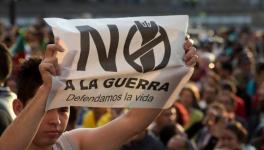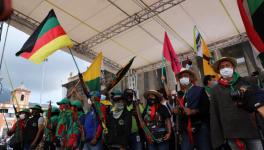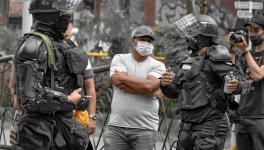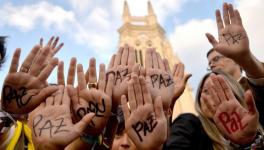Jesús Santrich, FARC Peace Negotiator, Arrested on National Victims Day
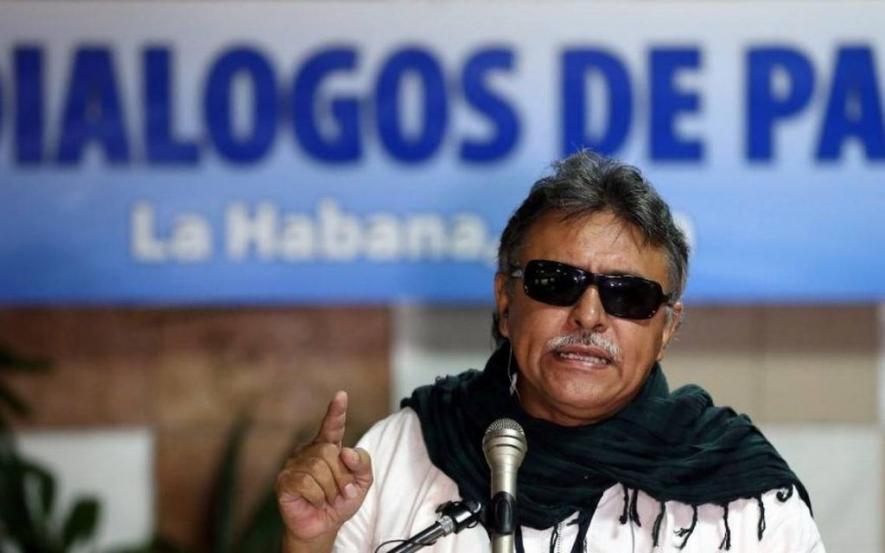
Jesus Santrich in Havana during the peace talks
While thousands of people marched on the streets of Colombia on the occasion of the National Day of Memory and Solidarity with the Victims of the Armed Conflict, ‘Jesus Santrich’, one of the members of the Peace Negotiation Team of the Revolutionary Armed Forces of Colombia-People’s Army (FARC-EP) and member of the FARC’s new political party, was arrested at his home in Bogotá for drug trafficking. Colombian authorities claimed that the request for his arrest came from a court in New York, and could possibly result in his extradition to the United States. His arrest is a huge blow to the already fragile peace process that was signed between FARC-EP and the government on November 24, 2016.
Santrich & detention
The details of the investigation that led to the detention of Santrich by the Technical Investigation Team of the Attorney General’s Office are still unknown. However, social movements in Colombia and especially members of the Common Alternative Revolutionary Force , Santrich’s political party, read his arrest as an act of political persecution and stigmatization, an attempt to further destabilize the peace process and a complete violation of what was stipulated in the peace agreements.
Following his arrest, Jesús Santrich announced that he will begin a hunger strike and warned the rest of the demobilized FARC-EP members that his arrest was part of a campaign of persecution to foment hatred and stigmatization towards the group and that everyone should remain alert. He also called on the FARC-EP political prisoners that still remain in prison to join him in his strike in a broader call for freedom for all political prisoners. Rumors have been circulating online that other members of the party may be arrested.
Iván Marquez, member of the FARC political party, a former guerrilla commander and member of the FARC-EP peace delegation, said that “the arrest of Jesús Santrich is based on a false accusation and and was carried out in a treacherous way. This is the worst moment that the Peace process is going through. The government should act and prevent these false accusations that end up generating mistrust amongst all ex-combatants.”
“This is a very delicate and dangerous situation. It shows once again what we have been denouncing around the legal insecurity and lack of guarantees that we have as members of the FARC political party” commented Victoria Sandino, ex-commander, member of the FARC-EP peace delegation and current member of the FARC political party.
Santrich’s arrest is also a direct violation of the Havana peace agreements. Article 71 of the Final Peace Agreement states “Extradition cannot be conceded, nor preventative custody with the intention of extradition in regards to acts or behavior being studied by the Comprehensive System of Truth, Justice, Reparation and No Repetition”. Santrich submitted himself to the Special Jurisdiction for Peace, the special tribunal of the aforementioned Comprehensive System, in December 2017 thus making his arrest and threat of extradition a violation of the peace agreements that were ratified in Colombian Congress.
It is important to mention here the case of FARC-EP political prisoner Simón Trinidad, who was extradited to the United States in 2004 under irregular legal proceedings. He has spent 12 years in a “supermax” federal prison in Colorado in complete isolation – an explicit violation of the United Nations Convention against Torture – for his alleged role in the kidnapping of three U.S. military contractors in 2003. In 2016, FARC negotiators lobbied for Simón Trinidad’s release to Colombia so he could be tried by the Special Jurisdiction for Peace but their request was denied.
Video in which Simón Trinidad shows the conditions of his incarceration
The mounting physical violence against FARC-EP ex-combatants is also a cause for alarm. Between January 2017 and March 2018, 92 demobilized FARC-EP members were murdered, as were many of their family members. The government refuses to admit involvement in these deaths and maintains that they are isolated incidents of inter-guerrilla conflict or personal fights.
April 9, National Victims Day
It is significant that Santrich was arrested on the National Day of Memory and Solidarity with the Victims of the Armed Conflict. It is a day where victims, family members, social movements, and human rights organizations mobilize to remind Colombian society and the government that they do not forget the crimes committed by the state and other actors in the 70 year conflict. The day marks a challenge to the impunity enjoyed by the Colombian state.
April 9 commemorates the assassination in 1948 of Jorge Eliécer Gaitán – one of the most beloved political leaders in Colombia and a presidential candidate at the time of his assassination. Gaitán famously said “The oligarchy does not kill me because it knows that if it does, this country will be upended and it will take fifty years to return to normal.” His prediction proved to be true. His assassination unleashed a series of events, including the Bogotazo, a series of massive riots, looting and assassinations in the capital city. It is estimated that somewhere between 500 and 3,000 people were killed. Over the long term, the incident led to a period called the La Violencia, which saw 10 years of violence between liberal and conservative armed groups. This marked the beginning of the current armed conflict in Colombia.
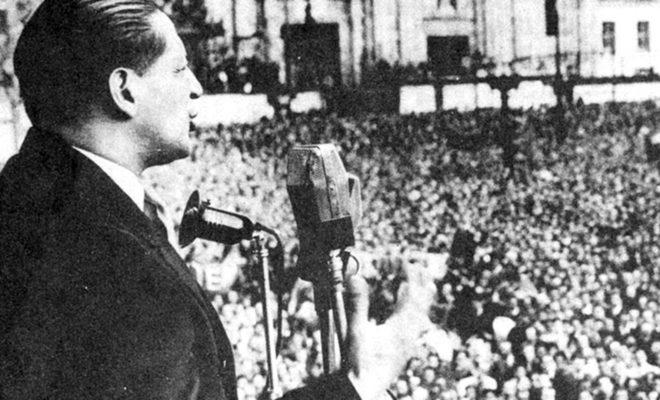
Jorge Eliécer Gaitán giving a speech. He said his most powerful weapon was his words.
Today, the political, social, economic and armed conflict continues, and social leaders and human rights defenders continue to be the targets of state and paramilitary violence. The social movement platform Congreso de los Pueblos (The People’s Congress), during the April 9 march, focused on the issue of the systematic assassination of social leaders. So far, in 2018, at least 43 such activists have been killed. The material and intellectual authors of these crimes walk free with total impunity. Meanwhile, the Colombian Government persecutes those who have dedicated their life to working for peace.
Get the latest reports & analysis with people's perspective on Protests, movements & deep analytical videos, discussions of the current affairs in your Telegram app. Subscribe to NewsClick's Telegram channel & get Real-Time updates on stories, as they get published on our website.













